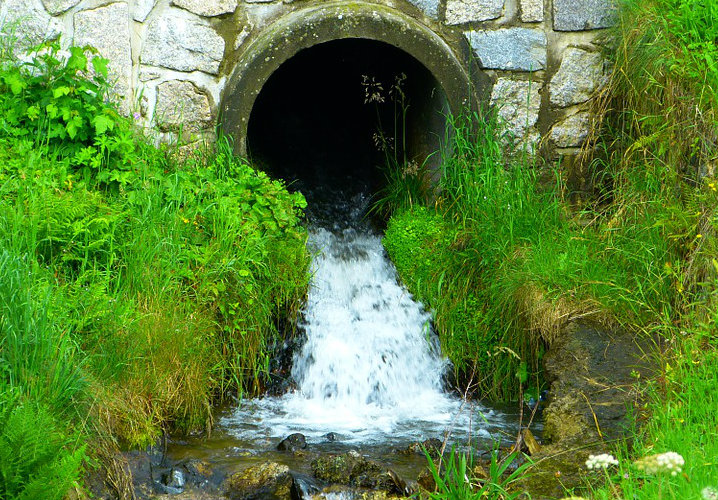Stormwater Management

Stormwater is the flow of water that results from precipitation and which occurs immediately following rainfall, or as a result of snowmelt. When a rainfall event occurs, several things can happen to the precipitation. Some of the precipitation infiltrates into the soil surface, some is taken up by plants, and some is evaporated into the atmosphere. Stormwater is the rest of the precipitation that runs off land surfaces and impervious areas.
Stormwater discharges are generated by precipitation and runoff from land, pavements, building rooftops, and other surfaces. These hardened surfaces are called "impervious surfaces" and they do not allow rainfall to infiltrate into the soil surface, so more of the rainfall becomes stormwater runoff. Stormwater runoff may accumulate pollutants such as oil and grease, chemicals, nutrients, metals, and bacteria as it travels across land.
Stormwater runoff may be carried through natural or manmade drainage ways or conveyance systems. In some cases, stormwater runoff leaves a site spread out over a large dispersed area as “sheet flow.” It may also be conveyed through natural ditches, swales, and natural drainage features. In most developing and urbanizing areas, stormwater is conveyed through a system of catch basins and pipes commonly referred to as a storm sewer system. At TWU, stormwater moves across campus through a combination of all of these methods.
Why be concerned about stormwater?
Stormwater can pick up debris, chemicals, dirt, and other pollutants and flow into a storm sewer system or directly to a lake, stream, river, wetland, or coastal water. Anything that enters a storm sewer system is discharged untreated into the bodies of water we use for swimming, fishing, and providing drinking water.
Polluted stormwater runoff can have many adverse effects on plants, fish, animals, and people:
- Sediment can cloud the water and make it difficult or impossible for aquatic plants to grow. Sediment also can destroy aquatic habitats.
- Excess nutrients can cause algae blooms. When algae die, they sink to the bottom and decompose in a process that removes oxygen from the water. Fish and other aquatic organisms can't exist in water with low dissolved oxygen levels.
- Bacteria and other pathogens can wash into swimming areas and create health hazards, often making beach closures necessary.
- Debris, such as plastic bags, six-pack rings, bottles, and cigarette butts, that are washed into waterbodies can choke, suffocate, or disable aquatic life like ducks, fish, turtles, and birds.
- Household hazardous wastes like insecticides, pesticides, paint, solvents, used motor oil, and other auto fluids can poison aquatic life. Land animals and people can become sick or die from eating diseased fish and shellfish or ingesting polluted water.
- Polluted stormwater often affects drinking water sources. This, in turn, can affect human health and increase drinking water treatment costs.
What TWU is doing
- Public Education, Outreach, and Involvement
- Illicit Discharge Detection and Elimination
- Construction Site Stormwater Runoff Control
- Post-Construction Stormwater Management in New Development and Redevelopment
- Pollution Prevention and Good Housekeeping
TWU is considered to be an operator of regulated Phase II Municipal Separate Storm Sewer Systems (MS4) and must submit an annual report to the Texas Commission on Environmental Quality. The MS4 Annual Report 2022 and MS4 Annual Report 2023 describe activities conducted during the previous reporting years to protect stormwater on the TWU Denton campus.
TWU has also developed a Spill Prevention, Control, and Countermeasures (SPCC Plan) for the Denton campus primarily aimed at controlling environmental impacts from potential releases of oils and petroleum products.
What you can do
There are a number of simple things that you can do that will help prevent stormwater pollution on campus:
- Never dump/pour anything into the storm drains or onto the ground!
- Do not litter the campus; practice good housekeeping. In addition to preserving the beauty of our campus, it will prevent debris from contaminating water bodies.
- Do not place materials in outdoor trash receptacles that will leak out or that will contaminate stormwater that falls into the container. Keep trash containers covered whenever possible.
- Do not wash or clean anything outdoors or allow wash water to run outdoors. This includes vehicle washing!
- Store materials (both liquids and solids) where they will not impact stormwater or are covered or contained appropriately.
- Provide liquids with secondary containment, such as a "spill pallet" or a flammable storage cabinet, if a leak or spill could reach the outside environment or a storm drain.
- Report any illicit dumping or discharges immediately to the TWU Police Department at 940-898-2911 or the EH&S Emergency Line at 940-898-4001 ext. 5.
Contact EH&S at 940-898-4001 ext. 3 with any suggestions for improving TWU’s management of stormwater.
Volunteer opportunities in Denton
TWU encourages members of the university community to participate in City of Denton stormwater involvement opportunities, including:
- Local stream cleaning events
- “Texas Stream Team” (volunteers are trained to sample/monitor surface water)
Find additional information at www.cityofdenton.com.
Training
Completion of Stormwater Awareness training is recommended for all members of the University community and is required for all employees who normally work on the Denton campus.
Page last updated 4:24 PM, August 13, 2025